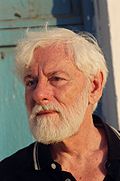This manifesto included a federation between the State of Israel and the State of Palestine, with the necessary joint institutions at the top. It also advocated the creation of a "Semitic Confederation" of all Arab states, Israel and perhaps also Turkey and Iran (which are not strictly Semitic countries, though they profess a religion with Semitic roots.)
SINCE THEN, the idea of a federation or a confederation has come up at different times and in different circumstances, but has not taken roots.
The terms themselves are imprecise. What is the difference between them? In different countries, they have different meanings. Russia is now officially a federation, though it is not clear what rights the components have. Switzerland calls itself a confederation. The German Bund is a "federal republic." The European Union is for all practical purposes a confederation, though it is not called so.
It is more or less accepted that a "federation" is a much closer union than a mere "confederation." This was made clear by the American civil war, when the "federal" North was battling the "confederate" Southern states which tried to secede from the union, which was too close for their liking.
But, as I said, these terms are very fluid. And they are not really important. It's the substance that matters, and the substance necessarily varies from place to place, according to history and circumstances.
FOR OUR country, the beauty of the idea lies in the fact that it squares the circle.
What do both sides want?
The Jews want a Jewish State, a state that is based on Jewish culture and history, speaks mainly Hebrew and is connected with the Jewish Diaspora. Except for a tiny little minority, this is an ideal common to all Jewish Israelis. Many Israelis would also like to keep the country, and especially the city of Jerusalem, united.
The Palestinians want a free state of their own, at long last, where they will be their own masters, speak their own language, foster their own culture and religion, free from occupation, under their own law.
A (con)federation can solve this seeming contradiction, squaring the circle. It would allow both peoples to be free in their own states, with their own identities, national flags and anthems, governments and soccer teams, while at the same time saving the unity of the country and solving their joint problems in unity and close cooperation. The border between them will necessarily be open for free passage of people and goods, without walls.
I am no expert on Northern America, but it seems to me that something like that already exists between the US, Canada and Mexico (at least until Donald Trump becomes president), in spite of the cultural and social differences between the three peoples.
PRESIDENT RIVLIN should not be satisfied with airing the idea. He should do something about it, despite the limitations of his office.
I would suggest that he set up a high-level conference of experts to meet in his residence and start to go into the details, in order to find out how this could look in practical terms.
I don't believe that either side will be content with an "entity." Jewish Israelis will not give up the statehood of Israel, nor will the Palestinians be content with anything less than a "state."
First and foremost there is the problem of the army. Will there be two separate armies, with some apparatus of coordination -- unlike the very unequal relationship that exists now between the Israeli army and the Palestinian "security force"? Can there be one unitary army? Or something in-between?
That's a hard one. A much easier one is health. There, a lot of cooperation already exists between the peoples, with Arab doctors and medics working in Israeli hospitals, and Israeli doctors advising Palestinian colleagues in the occupied territories.
(Note: You can view every article as one long page if you sign up as an Advocate Member, or higher).





